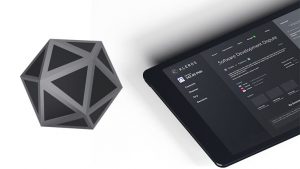
It’s a bold claim. To explain where they are coming from, Federico Ast, CEO and Clément Lesaege, CTO have released a white paper that describes how Kleros works in detail. In the abstract they say: “Kleros is a decentralized application built on the top of Ethereum that works as a decentralized third party to arbitrate disputes in every kind of contract, from very simple to highly complex ones. It relies on game theoretic incentives to have jurors rule cases correctly. The result is a dispute resolution system that renders ultimate judgments in a fast, inexpensive, reliable and decentralized way.”
How does Kleros work?
The starting point is an agreement between parties that is built on the Kleros system. As part of that agreement, both parties agree that any disagreement will use the Kleros Court as its dispute mechanism. They agree which court will rule on the dispute, the number of jurors and the possible outcomes. As soon as a dispute arises one or both parties initiate the resolution process. The person initiating the dispute fills out a form explaining the claim.
The claim is then allocated to a specific subcourt in the Kleros system. Potential jurors with domain specific expertise and who are looking for arbitration work log in to the Kleros system. They find cases that are within their abilities to rule. If they are interested, they pay a fee to arbitrate. That fee is paid in pinakion. This is the token used in the Kleros system. The more pinakion the juror pays, the more likely they are to be allocated to the case.
Each case is ruled on by several jurors. They each get an email and a period of time in which to make their decision. Once they have voted, the parties in dispute are informed of the decision. At this point the jurors are paid for their involvement in pinakion.
Why not just use smart contracts?
One of the big claims for blockchain is the use of smart contracts. The term smart contracts has been around for over two decades thanks to Nick Szabo. They are designed to be self-executing or self-enforcing based on the criteria coded into the contract. The challenge with smart contracts is that they are not designed to cope with disputes.
When the conditions coded in the smart contract are met, it executes the code. This is perfectly fine if the condition is that 100 widgets are delivered to a factory. The creation, shipping and arrival processes are all logged on the blockchain. If less than 100 arrive then depending on how the blockchain and shipping processes are set up, the point of loss and who carries that loss is also defined.
This is the approach taken by Mahindra. Goods from small suppliers are checked into the shipping chain at which point they are paid for what they have shipped. As there is a blockchain record of who took control of the goods and where they went, it means that the point of loss and responsibility is more accurately identified.
But what if this is about functionality in software? This is the example used in the white paper. Performance and functionality are rarely fully defined in most software contracts. Kleros provides the opportunity to deal with resolution by using jurors who are experts in software design. In effect, this is enhancing the smart contract not replacing it.
How does Kleros validate the jurors?
This is a more interesting question. The world is full of self-professed experts. If the goal here is to bring subject matter expertise to bear, Kleros needs to understand more about its jurors. This does not mean that the personal details of jurors is exposed to those seeking resolution.
One solution that could be implemented here is a blockchain-based skills solution. IBM and Sony have built such a system for education. It records all the educational records for individuals from school through to degree or doctorate. The system can even be integrated into corporate HR systems to record post education qualifications.
This makes it very hard for anyone to enter fake degrees onto the system. Even if such degrees were entered, as soon as the organisation awarding them was exposed, all records could be marked as invalid.
In a normal court, expert witnesses are expected to be able to prove why they should be acceptable to the court. This is based on educational and professional qualifications. There is no reason why this should be the case for Kleros. In fact, it could be argued that as the jurors are both bidding for work and getting paid for their arbitration, their skills should be provable and recorded.
What does this mean?
This is an interesting evolution of dispute resolution. It opens up the resolution process to those with limited funds especially when the parties in dispute are based in different countries.
At the moment, Kleros is still being developed and there are questions that need to be addressed. For example, how will this integrate with the wider legal system? While the agreement of both parties to be bound by Kleros is recorded on the blockchain, will that be accepted by the establish legal system?
In the USA, several states are now looking at the potential for blockchain. It will be interesting to see if Kleros can cut a deal with any of them to be accepted as a valid alternative to turning up in court.


























